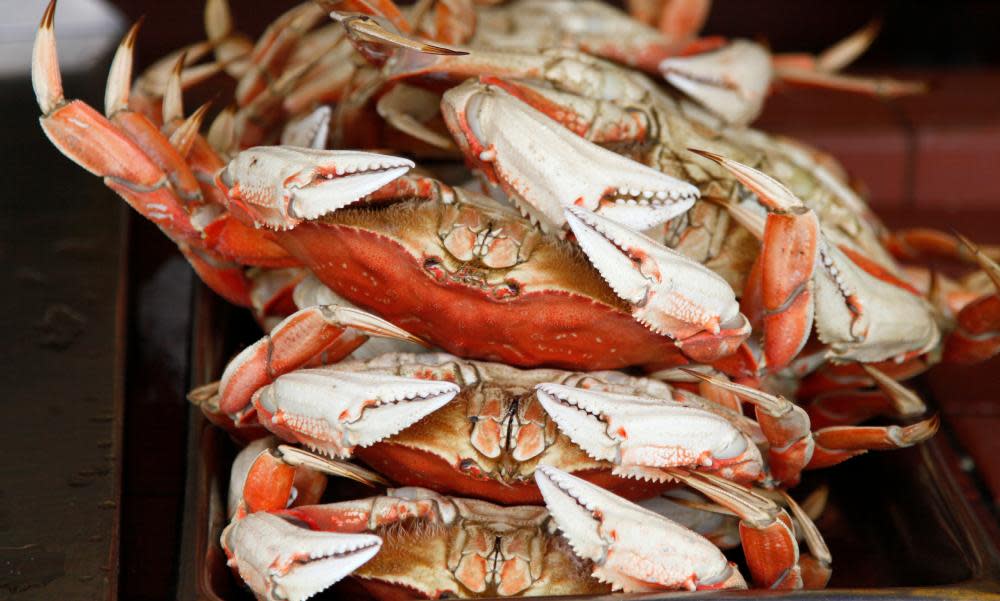Claws out: crab fishermen sue 30 oil firms over climate change

For the fourth-generation crab fisherman John Beardon, the warming of Pacific waters off the coast of California has meant toxic crabs, shortened fishing seasons and a near decimation of his livelihood as a crab boat captain. Now he would like to see the industry he says is responsible pay for the damage.
On Wednesday, associations representing California crab fishermen like Beardon filed suit against 30 fossil fuel companies seeking to make the companies pay for the harm global warming has caused to California’s fisheries. The suit demands that petroleum interests finance the changes that will be needed to sustain the crab fishing industry in the future.
“We just about can’t make a living fishing crabs any more,” said Beardon, who has seen the earnings he can make with his 35ft crab boat, Stormy II, cut in half in recent years because of the effects of ocean warming. “I’d like to see the industry that caused this take responsibility for that.”
The lawsuit, filed in California state superior court by the Pacific Coast Federation of Fishermen’s Associations, is the first legal action by a private industry group seeking to hold the fossil fuel companies responsible for major losses attributed to global warming. It seeks unspecified damages from defendants including Chevron, ExxonMobil and BP. The suit also names 27 other petroleum companies.
“We’re taking a stand for the captains and crew, their families and the business owners that support the fleet,” said Noah Oppenheim, the association’s executive director. “The fossil fuel companies named in our lawsuit knowingly caused harm, and they need to be held accountable.”
The suit follows a slew of legal actions filed in the last 18 months by government agencies, including the cities of New York City and San Francisco and the state of Rhode Island, claiming that the petroleum industry has long known about the devastating effects their products cause to the climate but has done little to stop them.
In June, a federal court judge threw out two suits from the cities of San Francisco and Oakland. Judge William Alsup of the US district court for the northern district of California wrote in his ruling that while he accepted the science behind global warming, “the problem deserves a solution on a more vast scale than can be supplied by a district judge or jury in a public nuisance case”. He also cited the benefits that have come from petroleum products.
Early this month, the US supreme court refused to stop a lawsuit brought by a group of children and young adults, which seeks to force the US government to do something about climate change. Another federal court recently paused the case after the Trump administration requested a temporary stay.
The fishermen’s suit raises the question of who should have to bear the costs of financing the major adaptions that industry – and society – will have to make to survive global warming.
“Defendants have known for nearly 50 years that greenhouse gas pollution from their fossil fuel products has a significant impact on Earth’s climate, including a warming of the oceans,” reads the suit. Yet “defendants concealed the dangers, sought to undermine public support for greenhouse gas regulation, and engaged in massive campaigns to promote the ever-increasing use of their products at ever greater volumes”.
Chevron, which has a major refinery in the San Francisco Bay Area, did not immediately return calls from the Guardian. But R Hewitt Pate, Chevron’s vice-president and general counsel, called for cooperation, not blame, after the dismissal of the San Francisco and Oakland cases in June.
“Tackling the difficult international policy issues of climate change requires honest and constructive discussion,” he said. “Using lawsuits to vilify the men and women who provide the energy we all need is neither honest nor constructive.”
Starting in 2015, crab fishermen have had to contend with dramatically shortened fishing seasons because the warming of ocean waters has caused huge algal blooms along the Pacific coast. The blooms were blamed for causing a buildup of a neurotoxin, domoic acid, in the crab population, making the crabs potentially poisonous to eat.
The start of the 2015 crab season, usually in November, had to be pushed back until the following March. The season was shortened in 2016 and 2017 as well. This year, the crab season will be allowed to open as usual, on Thursday, but one section of the northern California coastline will be closed for fishing.
The unpredictable and dramatically shortened seasons have taken a huge toll on the fleet of small fishing boats that usually supply a bounty of fresh Dungeness crab for the state’s restaurants and holiday tables.
“For some of these fishermen, losing a season means having to sell the boat. And many of them did,” said Oppenheim of the disastrous 2015-16 season. “We’re talking about families having to go to the bread line.”
In releasing the suit, the fishing association called for the petroleum companies to fund studies that will help crab fishermen survive ocean warming and suggested that money could be used to study new ways of making crab fishing viable, such as keeping crabs in holding tanks so that they could expel toxic acids.
Beardon, who fishes for Dungeness out of Crescent City, California, said he has had to go to work as a logging truck driver during the summer months in order to sustain his family crabbing business.
“The last three years have been really hard,” said Beardon, “Our community came together and held a fish fry to help our crew members. But fish fries and disaster relief are no solution to these closures we’re now seeing year after year after year.”

 Yahoo News
Yahoo News 
